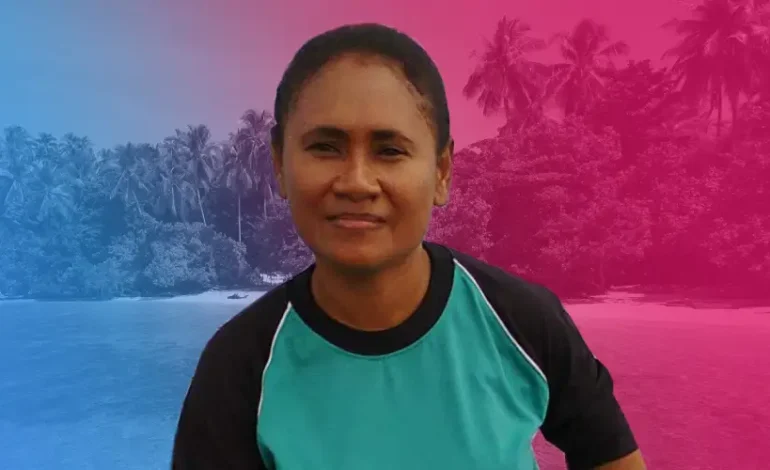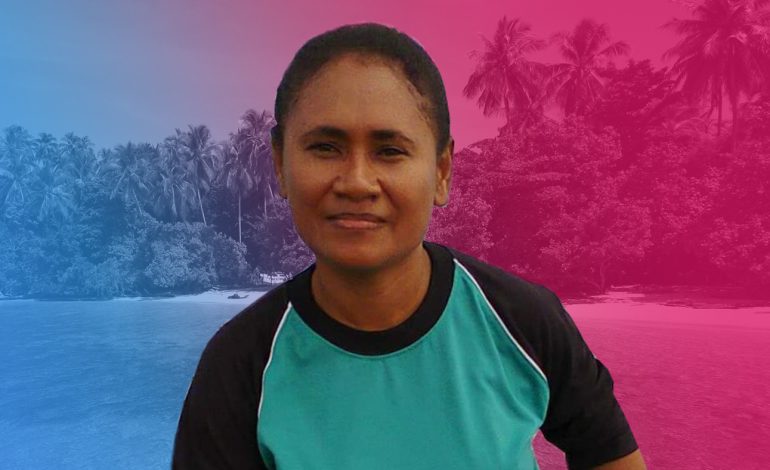Puskesmas Head in Papua on the Importance of Immunization, Proactive Health Work

To carry out her duty as the manager of the immunization program in remote Moor Island, Papua, nurse Yudith C.M. Raru has to take a five-hour trip to reach the small island in Cenderawasih Bay, Nabire Regency, about 1.5 hours flight from the provincial capital, Jayapura. From Nabire, Yudith travels by car for an hour to the Samabusa Port, before taking a speed boat for three hours to the Moor Island.
“That is, if there is no change in the weather. If there are waves, rain, and wind, it can take up to 4-5 hours,” the 51-year-old woman said to Magdalene in an interview via video conference recently.
As the head of Moor Island’s Community Health Center (Puskesmas), Yudith never gets tired of reminding everyone on the importance of immunization, although some residents prefer to avoid health workers. When the Puskesmas announces its immunization schedule through the church, some residents still refuse to come.


To overcome this challenge, Yudith believes the importance of a “gentle” approach through counselling or education. Often she combines this with the distribution of basic products from sugar to soap and toothbrushes. Yudith and other Puskesmas officers visit the homes of Moor Island’s residents on their own initiative, even going as far as dropping by on women who skip the immunization session at their farmlands.
“As a native of Moor Island, I want to change people’s view. Immunization is a basic necessity that will protect them from diseases throughout their life,” she said.
Her persistence has brought results, a number of residents now routinely take their children for immunizations, despite their initial doubts when their children had post-immunization fever.
“We told them that it is normal to have a fever if ‘something new’ enters the body causing the temperature to rise,” Yudith explained.
Immunization Prevents Death and Protects Community
According to the World Health Organization (WHO), immunization can prevent up to 2-3 million deaths each year from diseases such as tetanus, diphtheria, and measles. If more people are protected with immunization, another 1.5 million deaths can be prevented. Immunization can break the chain of diseases and malnutrition, and protect people from deadly diseases such as polio and meningitis. Children who have been vaccinated can protect the community by stopping the transmission of diseases.
Also read: Where Hospital is Not an Option – Giving Birth in Remote Rural Indonesia
In Indonesia, vaccines classified as basic immunization that targets children from age 0 to grade school protect against hepatitis B (HB), tuberculosis and polio (BCG & Polio), diphtheria, pertussis, tetanus (DPT), and measles.
Yudith’s tireless efforts to ensure that all residents of Moor Island are vaccinated are further driven by the fact that two chronic diseases—tuberculosis and leprosy—are still endemic in that area. For those who have contracted the illnesses, merely prescribing medicine is not enough.
“We haven’t been able to break the chain. Every time we prescribe them medicine we also have to make sure that they really take it, especially young people. We inform them that the medicine is important for their health. This is where family’s role in raising awareness is also very useful,” she said, noting that tuberculosis treatment must go uninterrupted for six months.

Immunization in the time of Pandemic
According to Global Vaccine Alliance, during the pandemic 21 countries experienced shortages of vaccine stocks due to territorial restrictions. Indonesia faced a shortage of IPV and polio vaccines stocks. The Rapid Assessment: Impact of COVID-19 Pandemic On Immunization Services In Indonesia, a survey conducted by UNICEF and the Ministry of Health in April last year reveals that immunization process were delayed due to other factors as well, including the high risk of COVID -19 transmission, limited number of health workers dedicated to vaccination, transportation disruption caused by road restrictions, and school closures.
But World Health Organization (WHO) said in April last year that global immunization had not been carried out efficiently even long before the pandemic. Data from WHO in 2018 shows that 19.4 million children still do not receive routine immunization. Of this number, 60 percent come from 10 countries, including Indonesia.
Maluku and Papua are identified as regions that have not carried out sufficient immunization because of the low socio-economic factor, according to another study on immunisation coverage of in Indonesia. The study was conducted by two researchers from King’s College London.
Also read: Why HIV Awareness Campaign Should Target Health Workers Too
Against this backdrop, the role of health workers like nurse Yudith in Moor Island in ensuring all residents have been immunized in remote areas is crucial. She persistently and routinely convinces the community about the importance of vaccination, putting up banners with eye-catching illustrations and approaching people personally.
“It is different from other areas, such as Jakarta, where residents seek immunization without being told to. In the Papua region, we have to come up with various ways so that the facility is accepted by the community and so we can provide the best for them,” she said.
During the pandemic, health workers like her also actively remind their communities of the importance of maintaining health protocols such as wearing masks and maintaining distance. Fortunately, she said, all Puskesmas officers in Moor Island had received the COVID-19 vaccine.

The Power of Female Health Workers
Growing up in a farming family, Yudith became a nurse at 20 years old after completing her education in Health Nursing School. She was appointed Head of the Puskesmas 13 years ago by the Head of the Nabire Regency Health Office.
Ever since she was a teenager, she had always wanted to help people through health services, she said.
“In Papua, we help people who are completely untouched by health services, such as those in remote areas, especially in Nabire Regency,” she said.
When she first took office, Yudith was the only woman among the five Puskesmas staff at the time. As time went by, the number of female health officers on Moor Island has also increased. Now the Puskesmas has the largest number of female staff compared to other health centers.
“Apart from my own wish to serve the Moor Island, the head of the local Health Office at the time, who was also a woman, wanted a woman for the head of Puskesmas. She believed that women have a different approach that would make them more effective to lead the Puskesmas,” she said, adding, “With a woman leader, the Puskesmas’ services are better now.”






















